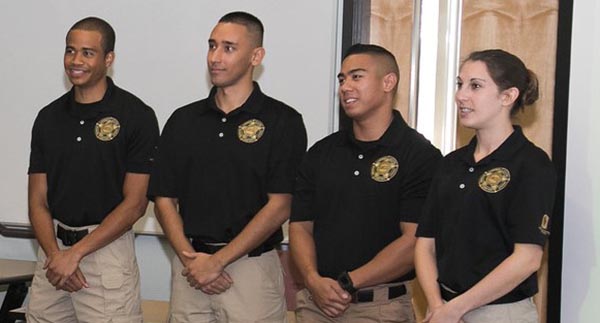 From left, Tim Bocker, Joshua Heredia, Denzel Rencaen and Tara O'Sullivan make up the first group to get through the Law Enforcement Candidate Scholars program at Sac State.
From left, Tim Bocker, Joshua Heredia, Denzel Rencaen and Tara O'Sullivan make up the first group to get through the Law Enforcement Candidate Scholars program at Sac State.The first students to complete Sacramento State’s groundbreaking Law Enforcement Candidate Scholars (LECS) program – the first of its kind in the nation – are all headed to the Sacramento Police Academy.
The four graduating seniors are a diverse group and in many ways reflect the community they’ll serve as police officers: Tara O' Sullivan, a child development major, is white; Timothy Blocker and Denzel Rencaen, both criminal justice majors, are African American and Filipino, respectively; and Joshua Heredia, an ethnic studies major, is Latino.
They were honored with a reception Friday, Dec. 8, in Folsom Hall. Attendees included Sacramento Police Chief Daniel Hahn, who was #MadeAtSacState; President Robert S. Nelsen; Chris Mateo, senior field representative for state Assemblyman Jim Cooper; Fred Baldini, dean of the College of Health & Human Services, and Ed Mills, vice president for Student Affairs.
“LECS is a one-of-a-kind program,” says Melissa Repa, interim director of Sac State’s Career Center. “There are law enforcement programs on other college campuses, but unlike them, LECS challenges the ‘status quo’ and focuses on changing the outcomes we currently see in law enforcement.
"LECS prepares individuals to enter a law enforcement academy as potential future leaders and change agents.”
LECS (pronounced lex) was founded by Shelby Moffatt, a former Sacramento Police officer who teaches in Sac State’s Division of Criminal Justice and is the program’s director.
He was joined in October 2016 by Sac State President Robert S. Nelsen, then-Sacramento Police Chief Sam Somers Jr., and California Highway Patrol (CHP) Assistant Chief Jonni Fenner to sign the “scholars to officers” partnership agreement. Moffatt called it “a momentous, historic, groundbreaking occasion,” adding, “We believe this to be the gold standard in higher education.”
Somers, also #MadeAtSacState, said LECS is a “model program” that will “get people into the (law enforcement) profession and ready to hit the streets.”
LECS is open to all Sacramento State juniors and seniors, regardless of their major. The program’s goals include increasing retention and graduation rates, creating a strong partnership between Sac State and law enforcement agencies, and ensuring that law enforcement personnel and leaders mirror the state’s diversity.
In addition, the program emphasizes the importance of inclusion and cultural competence for future law enforcement leaders and recently held an event, Unconscious Bias and Its Influence on a Culturally Competent Environment, with community advocates.
“We focus on both career and leadership development – and positioning these scholars to become officers and to take leadership roles in the future,” Moffatt says. “Now these students not only will graduate from Sacramento State, but they will have jobs in law enforcement.”
Participants choose whether to pursue a career with CHP or Sacramento PD. In the spring, an additional eight LECS graduates will attend the police academy and another 10 will go into the CHP’s academy. The two agencies waive academy fees for LECS graduates.
Participation in the historic scholars-to-officers program is demanding. In addition to their academic studies, LECS students undergo rigorous fitness training and attend workshops on career readiness, effective communication, defensive driving, leadership development, and interview preparation. All LECS students, no matter their major, must complete an academic internship through the Division of Criminal Justice.
“LECS has given me mentors within the Sacramento Police department,” says O’Sullivan, the only female among the first four graduates, “and an inside look at what to expect in the academy: the tasks that will be asked of me, how to walk, what to wear, how to put up my hair. This is another edge I will have over other recruits in the academy.”
Recaen also points to the program's benefits.
“LECS has given me the resources to gain an edge in becoming a law enforcement officer," he says. "The program absolutely played a crucial role in helping me obtain my spot in the January 2018 academy.”
Additional agencies, including California State Parks, Department of Corrections, and Alcohol Beverage Control, have expressed an interest in participating in LECS.
“In addition to an obvious sense of pride, I feel more determined than ever to make as many young women and men career-ready for sworn law enforcement officer positions and, in the process, help to improve their lives as they also prepare to graduate from Sacramento State,” Moffatt says.
“I will continue to put forth the same dedication, motivation, enthusiasm, and determination for every current and future LECS candidate as I have for the first four.” – Dixie Reid
